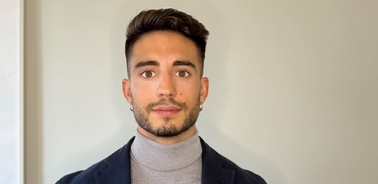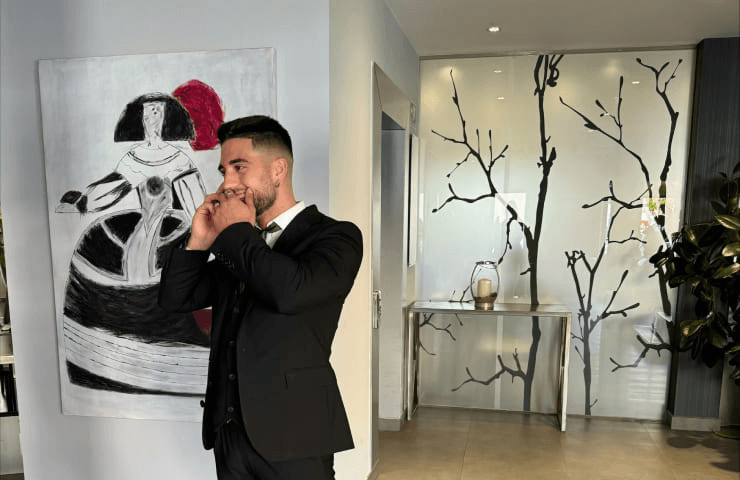Faculty Spotlight: Alejandro Vaca

Meet one of IE’s School of Technology most innovative AI leaders Meta Description: Meet one of IE’s School of Technology most innovative AI leaders.
A pioneer in AI innovation and CEO and founder of LenguajeNatural.AI Alejandro Vaca is a leader in innovation and a much-loved professor at IE University School of Science and Technology. He has extensive experience in the fields of Natural Language Processing (NLP), Generative Artificial Intelligence and Machine Learning (ML) and is internationally recognized as a leading talent in the field of data science and artificial intelligence, a knowledge he aims to instill within his students.
Passionate about creating a positive social impact through AI innovation, Alejandro has participated in various challenges within the data science industry obtaining numerous notable accomplishments. Including, Best Poster Presentation of the “BioMedIA” award at the NAACL 2022, winning project at the SomosNLHackaton 2022, and best data scientist at the SpainAI Hackaton 2021. He is also the creator of NLPboost, a library for automatic training, optimizing and benchmarking of transformer models.
Alejandro is a Professor of Artificial Intelligence and Natural Language Processing topics at IE University, as well as a professor at AFI Escuela de Finanzas and Universidad Europa. He is also the Senior Data Scientists at the IIC (Instituto de Ingeniería del Conocimiento).
Meet one of IE School of Science and Technology’s top professors.
At IE School of Science and Technology, we talk a lot about being built to breakthrough. What has been your biggest professional or personal breakthrough and why?
It’s difficult to single out just one breakthrough in my professional career so far. The first significant breakthrough was when I managed to create the most powerful Spanish language model at the time, RigoBERTa. I dedicated about two years to this project, working long hours, including weekends and nights. It felt almost like babysitting the language model. So, when the pre-training finished, and the experiments confirmed that I had achieved a new State of the Art, it felt like reaching the top of Everest after a long and challenging climb.
The second breakthrough I would highlight was launching my own company, LenguajeNatural.AI, in March 2024. Starting a company from scratch without external investors, relying solely on my savings, involved calculated risks, tenacity, discipline, and a strong belief that I could apply my knowledge to a greater purpose.
What brought you to IE? Where were you before? And what keeps you here?
I have always been passionate about teaching. From the beginning of my career, I’ve made it a point to share what I’ve learned as an AI engineer. There are several reasons for this. First, you only truly understand something when you teach it. Until you have to explain it to others, you don’t fully articulate what you intuitively know. Teaching reinforces your own knowledge. Furthermore, I love the feeling of inspiring others to share my passion for AI. I believe it’s a fascinating field, and I want to pass on that excitement to others.
That’s how I got into teaching, first at ESIC and now at IE. Teaching at IE is a great honor—it's one of the most prestigious educational institutions globally, and a fantastic place to work. What keeps me here is the high caliber of students, the pride of being a professor at a top university, and the deep sense of fulfillment I experience every time I step into a classroom.
What trends are you most excited about in science and technology and why?
I’m particularly excited about the applications of AI in healthcare, especially in public health. I believe we have a tremendous opportunity as a society to provide better healthcare for everyone, and we should seize it. However, I am somewhat concerned that these technologies could end up widening the gap between the quality of healthcare received by different social classes, which would exacerbate inequality. So, to summarize, while we must address the technical challenges of these problems, we also need to carefully consider the ethical and moral implications of AI applications.
Have you ever had an a-ha moment while teaching that furthered your research? What was it?
Yes, I’ve had such moments. Once, while observing my younger students (3rd and 4th year undergraduates), I noticed they spent more time interacting with their screens than with each other when not listening to me. This contrasted with my Master’s students, who often felt a strong need to discuss topics with one another. This made me realize the differences in communication habits between newer and older generations, which sparked an interest in researching this topic further. This research has laid the groundwork for something I can't reveal just yet (sorry for the cliffhanger), but you’ll hear more about it in the coming months.
What book do you wish your students would read before taking your class and why?
The Master Algorithm: How the Quest for the Ultimate Learning Machine will Remake Our World or How to Create a Mind: The Secret of Human Thought Revealed. Both books offer fascinating insights into the various approaches to building intelligent systems. They are very accessible for students and introduce the most important “tribes” of Machine Learning in a way that’s easy to grasp and highly relevant to the subject matter we cover in class.
Please name one of your articles or studies you feel addresses the pressing issues for 2024?
Although I haven’t published anything publicly since 2022, there are two articles that I believe lay the foundation for understanding key aspects of language models and Retrieval-Augmented Generation (RAG) systems, which are gaining popularity. These are: RigoBERTa: A State of the Art Language Model for Spanish and BioMedIA: A Complete Voice-to-Voice Generative Question Answering System for the Biomedical Domain in Spanish. The latter won me the Best Poster Presentation Award at NAACL 2022 and focuses on a RAG system in Spanish for the biomedical domain.
Tell us one personal thing about yourself that none of your students know. A hobby, sport or talent? Strange fact? Unusual interest?
I love psychology and neuroscience, though my students probably already know this since I frequently share insights from these fields during class. I like to incorporate both technical knowledge and personal perspectives on life. However, what most of them likely don’t know is that I play the piano and write poems and short stories in my free time (although, as I get older, that free time is becoming more and more scarce).
